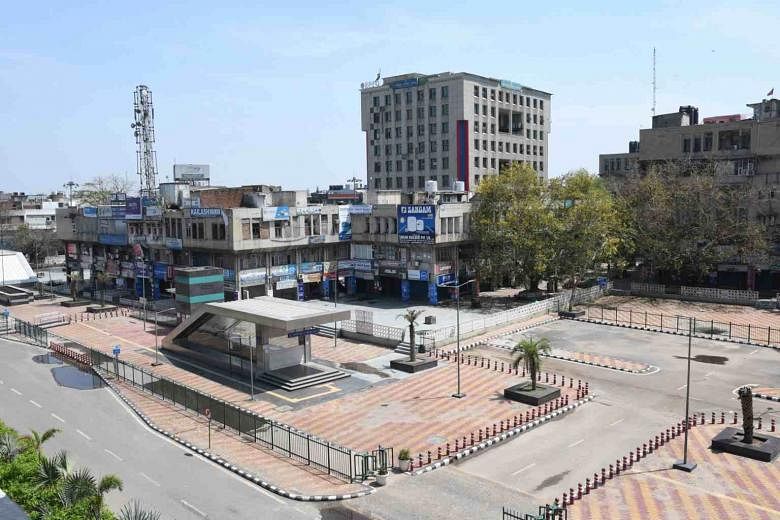NEW DELHI - Mr Alam Rahman has just about enough savings to see him and his family through for about 15 days.
The owner of a roadside tea stall in Noida, one of Delhi's satellite cities, is worried that he will not be able to pay rent on his house and other expenses after that.
"I am not sure I can open my tea stall again," he told The Straits Times a day after Prime minister Narendra Modi announced a 21-day countrywide lockdown on Tuesday night (March 24).
Even if he does open his stall, it is unlikely to be of much help, as the number of customers has fallen from more than 100 a day to just around 10, amid the coronavirus outbreak.
Many of his customers were migrant daily wage workers who now have no work and have either left for their villages or are hunkering down and saving for the tough time ahead.
"I have to figure a way out," he said, stoically.
Across India, millions of migrant workers like Mr Rahman, who is from the state of West Bengal, now find themselves suddenly stranded without work and no means to return home.
Some of the desperate among them have even resorted to walking home.
Indian television channel NDTV on Wednesday reported on a group of around 20 men who had been asked to vacate the accommodation provided by their employer.
They set out from Uttar Pradesh's capital Lucknow for their home 80km away - a journey that will take around 36 hours on foot.
Walking home, however, is not an option for a Kerala gardener ST spoke to and who did not want to be named. He comes from a village nearly 2,000km away in Odisha.
With no work for more than a week, he has been forced to dip into savings that he would have sent to his family.
"I am not going to send them any money this month. I am not even sure I will be able to do so the coming month too," he said.
"The government should think of some way to help us get back to our homes," he added.
Even well-heeled Indians are unsure of how they will see themselves through the 21-day lockdown, with concerns over the supply of food and medicine.
Mr Modi's address imposing a "curfew-like" lockdown on Tuesday night, without specifying how people can gain access to essential goods, had unleashed a wave of panic among Indians, with many rushing out to grocery shops even while he was making his address.
Social distancing norms were tossed to the wind as large crowds crammed India's grocery stores for whatever food items they could get.
For many, this was reminiscent of the night of Nov 8, 2016 when Mr Modi's announcement of a sudden decision to withdraw large denomination currency notes sparked chaos.
Mr Shantnu Prakash, a Bengaluru-based professional with a firm that retails lifestyle products, was one of those out looking for supplies on Tuesday night.
"I was ready for a lockdown for probably around eight days but not 21. One was not sure what was going to happen the next day," he said, adding that he stepped out to get additional supplies of rice and flour.
The first store he went to had run out of supplies and the second one had a long queue. "I didn't want to risk it and went to a smaller store nearby and was lucky to get what I wanted."
There has also been confusion over who are allowed to venture out during the lockdown.
For instance, despite being one of the "essential services" exempted from the lockdown, several food delivery firms have complained of harassment by police personnel.
Mr Anant Goel, the CEO of Milkbasket, a daily needs delivery service many urban Indian homes depend on, tweeted on Monday that its staff, vendors and vehicles were being "pushed back from the roads by local police".
The firm said it even had to dump 15,000 litres of milk and 10,000kg of vegetables on Monday because of disruptions it faced on the ground.
Even something as basic as access to drinking water has become a source of concern. Potable water is not supplied to taps in Indian homes and many depend on accessing large 20-litre canisters of drinking water sourced regularly from the market.
This, too, has become difficult, prompting them to reach out to the authorities on social media to ensure that they have access to drinking water supply.
Different state governments have, since Mr Modi's address, announced measures to ensure essential commodities reach homes.
In Uttar Pradesh, for instance, the government has announced it will deliver essential commodities directly to homes.
The Delhi government has also announced an assistance of 5,000 rupees (S$95) for construction workers, as well as free food for the homeless and needy at its night shelters.
But intent or policy has not always been matched by delivery on the ground in India, and it remains to be seen how well these schemes work as the lockdown progresses.


